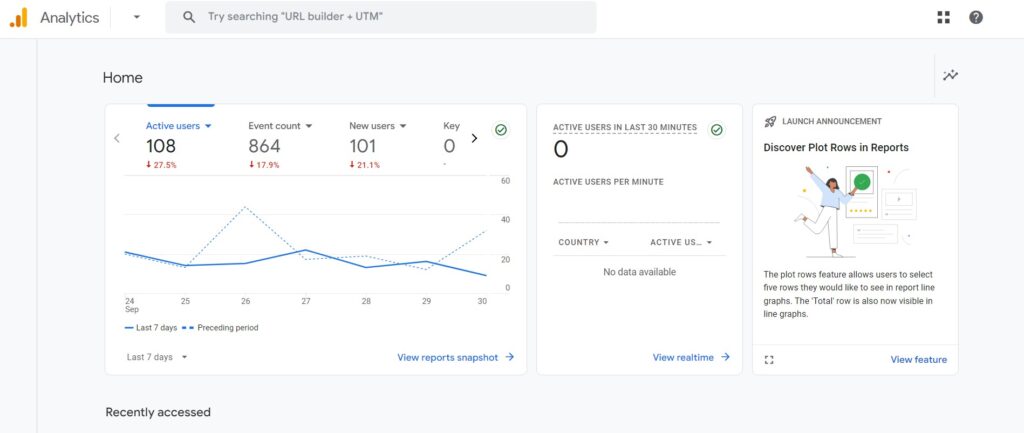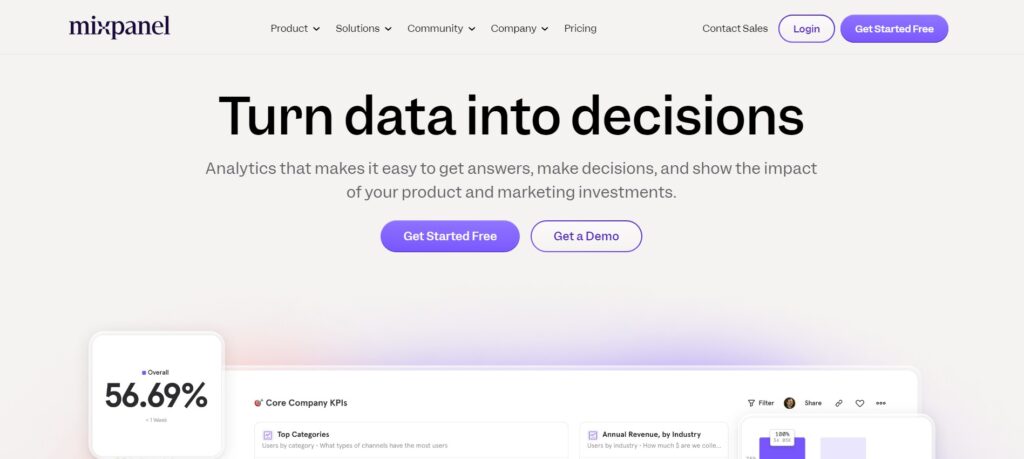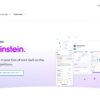5 Of The Best AI Marketing Analytics Tools
With the power of artificial intelligence, these tools provide actionable insights, predictive models, and automated reporting, empowering marketers to make smarter decisions and achieve better results.
With AI marketing analytics, businesses can go beyond traditional metrics, uncover hidden patterns in data, and gain a competitive edge in today’s ever-evolving digital landscape.
1. Google Analytics 4 (GA4)

This tool stands out as one of the best AI marketing analytics tools, offering advanced features that enable businesses to track user engagement, gain insights into customer behaviour, and enhance marketing strategies.
As an evolution of the original Google Analytics, GA4 incorporates machine learning capabilities to deliver predictive analytics and smarter reporting.
Key Features of Google Analytics 4
Event Tracking: Unlike its predecessor, GA4 focuses on event-based tracking, allowing users to define and track specific user interactions.
This helps businesses understand how users engage with their content and products.
Cross-Platform Tracking: GA4 allows businesses to track user interactions across multiple platforms, including websites and mobile apps, providing a comprehensive view of customer journeys.
Predictive Analytics: The AI-driven predictive metrics help businesses identify trends, forecast user behaviour, and understand potential revenue opportunities based on user activity.
Enhanced Data Privacy: With growing concerns about data privacy, GA4 includes features designed to comply with regulations like GDPR and CCPA, ensuring businesses can gather insights while respecting user privacy.
Integration with Google Ads: GA4 seamlessly integrates with Google Ads, enabling businesses to link their advertising efforts with analytics, optimize campaigns, and drive better ROI. This integration can enhance AI-enabled marketing strategies.
Use Cases
- E-commerce: Businesses can track product performance, customer purchase behaviours, and sales funnel efficiency, allowing for tailored marketing campaigns based on user data.
- Content Marketing: Publishers can analyze which content engages users the most, helping to refine content strategies and improve user retention.
- App Development: Mobile app developers can gain insights into user engagement, retention rates, and app performance, driving better user experience and feature development.
Pricing
Google Analytics 4 offers a free plan, making it accessible for small businesses and individual users. For larger enterprises requiring more advanced features, Google Analytics 360 is available, with pricing starting around $150,000 per year.
For more information and to get started, visit Google Analytics.
2. HubSpot
HubSpot is a powerful platform designed to help businesses grow by providing tools for inbound marketing, sales, and customer service. With its user-friendly interface and robust features, HubSpot allows organizations to streamline their marketing efforts, enhance customer relationships, and drive sales efficiently.
Key Features of HubSpot
- Marketing Hub
HubSpot’s Marketing Hub offers a suite of tools to attract, engage, and delight customers. It includes features for email marketing, social media management, content creation, and SEO optimization. Businesses can leverage AI tools for content marketing to refine their strategies and improve user engagement.
- Sales Hub
The Sales Hub enables teams to track leads, manage sales pipelines, and automate tasks. This feature is essential for businesses looking to optimize their sales processes and drive more conversions. By integrating with tools like Google Analytics, sales teams can gain deeper insights into customer behaviour.
- Service Hub
HubSpot’s Service Hub focuses on customer support and relationship management. It provides ticketing systems, customer feedback tools, and knowledge bases, helping businesses deliver exceptional customer service. The integration of AI in customer support can greatly enhance responsiveness and efficiency.
- CRM
The HubSpot CRM is a free tool that helps businesses manage customer relationships more effectively. It allows for tracking interactions, managing contacts, and automating outreach efforts. This powerful feature helps organizations build stronger relationships with their customers, supported by AI tools for personal finance to manage budgets effectively.
- Reporting and Analytics
HubSpot provides detailed analytics and reporting tools to measure the effectiveness of marketing campaigns. Users can track website traffic, conversion rates, and customer engagement metrics. Businesses can integrate these insights into their overall AI strategy for better decision-making.
Use Cases
- E-commerce: HubSpot can help e-commerce businesses track customer behaviours, optimize product listings, and manage email campaigns effectively. Companies can enhance their online store presence with AI store builders.
- Content Marketing: Publishers and content creators can utilize HubSpot’s tools to manage their content calendars, optimize SEO, and analyze audience engagement. This approach is crucial for creating effective AI-generated content strategies.
- Lead Generation: HubSpot’s marketing automation features assist in capturing and nurturing leads through targeted campaigns and effective call-to-action strategies.
Pricing
HubSpot offers various pricing. Paid plan starts at $800 per month for premium plan
For more information and to get started, visit HubSpot’s official website.
3. Mixpanel
By offering in-depth analytics and data-driven insights, Mixpanel enables teams to optimize user experiences, drive engagement, and increase conversions.
This platform is particularly valuable for companies that want to make data-driven decisions based on user behaviour.
Key Features of Mixpanel
- Event Tracking
Mixpanel specializes in event-based tracking, allowing businesses to define and monitor specific actions taken by users. This feature provides granular insights into user interactions, helping teams identify trends and areas for improvement in their products.
- User Segmentation
With Mixpanel, businesses can segment users based on various criteria, such as behaviour, demographics, or engagement levels. This functionality allows for targeted analysis and personalized marketing strategies, enabling teams to deliver relevant content to specific audience segments.
- Funnel Analysis
Mixpanel’s funnel analysis tools help businesses visualize the user journey and identify drop-off points in conversion paths. By analyzing funnels, teams can optimize user flows, reduce friction, and enhance overall conversion rates.
- Cohort Analysis
Cohort analysis allows businesses to track specific groups of users over time. By understanding how different cohorts engage with products, teams can tailor strategies to improve retention and lifetime value.
- A/B Testing
Mixpanel offers robust A/B testing features that enable teams to test different versions of products or marketing campaigns. This data-driven approach helps businesses identify which variations perform better, allowing for informed decision-making.
- Integrations
Mixpanel seamlessly integrates with various tools and platforms, such as Google Analytics, CRM systems, and marketing automation tools. This connectivity allows for a holistic view of user interactions across different touchpoints.
Use Cases
- E-commerce: Online retailers can use Mixpanel to track user behaviours, such as product views, cart additions, and purchases, helping them optimize their sales funnels and improve customer experiences.
- Mobile Apps: Mixpanel is particularly beneficial for mobile app developers, providing insights into user engagement, retention, and app performance metrics. This information is crucial for enhancing user experience and feature development.
- SaaS Products: Software-as-a-Service companies can leverage Mixpanel to analyze user behaviour within their applications, allowing them to identify opportunities for upselling or improving user onboarding processes.
Pricing
Mixpanel offers a Premium plan begining from $ 24.00 per month
For more information and to get started, visit Mixpanel’s official website.
5. Tableau
It’s known for its ability to create interactive, real-time dashboards that are easy to understand, making data analysis accessible for both technical and non-technical users. Tableau is widely used across industries to make data-driven decisions through visual analytics.
Key Features of Tableau
- Data Visualization
Tableau excels in creating visually appealing, interactive dashboards and reports that can be customized to meet specific business needs.
Users can build complex visualizations from various data sources to gain insights quickly.
- Real-Time Data Analysis
Tableau connects to a wide range of data sources, including Google Analytics, Excel, databases, and cloud-based applications, enabling real-time analytics and up-to-date reporting.
- Drag-and-Drop Interface
With a user-friendly drag-and-drop interface, Tableau makes it easy for anyone to build visualizations and dashboards without needing deep technical expertise. The intuitive platform allows for seamless exploration of data.
- Interactive Dashboards
Tableau’s interactive dashboards allow users to drill down into the data and interact with visual elements to gain deeper insights. Users can filter data, explore trends, and make quick decisions based on visualized information.
- Data Collaboration
Tableau facilitates easy sharing and collaboration of insights with team members. Dashboards and reports can be securely shared, allowing others to view and interact with the visualizations in real-time.
- Mobile-Optimized
Tableau is mobile-friendly, allowing users to view and interact with dashboards and reports on any device. This feature is particularly useful for teams on the go who need real-time insights on mobile platforms.
- AI-Driven Analytics
Tableau integrates AI and machine learning capabilities to enhance data analysis. With the help of AI-powered features like HubSpot, natural language processing (NLP) enables users to ask questions of their data using everyday language.
Use Cases
- Finance: Financial analysts can use Tableau to track KPIs, create financial models, and monitor trends in real-time, aiding in strategic decision-making.
- Marketing: Marketing teams can leverage Tableau to analyze campaign performance, track user behaviour, and optimize their marketing strategies based on real-time data.
- Healthcare: Healthcare organizations can use Tableau to visualize patient data, monitor public health trends, and streamline operational efficiency by understanding data insights.
- Retail: Retailers use Tableau to analyze sales data, track customer preferences, and forecast demand, leading to optimized inventory management and personalized marketing.
Pricing
Tableau offers a premium plan Starting at $35 per month, this plan includes full analytics capabilities, allowing users to create and share interactive dashboards with unlimited data connections.
For more information and to explore Tableau’s offerings, visit Tableau’s official website.
5. Sprout social:
Sprout Social is an all-in-one social media management platform that helps businesses streamline their social media efforts by offering tools for content scheduling, audience engagement, and performance analytics.
It provides detailed insights into social media campaigns and allows brands to interact with their audience effectively across multiple platforms.
Key Features of Sprout Social
- Social Media Scheduling
Sprout Social allows users to schedule and publish content across various social media platforms, including Facebook, Twitter, Instagram, LinkedIn, and more. Its intuitive interface makes it easy to plan posts in advance and ensure consistent content delivery.
- Social Listening
With Sprout Social’s social listening feature, businesses can monitor brand mentions, track industry trends, and stay on top of conversations happening on social media. This enables them to engage with their audience in real-time and adjust their strategies based on customer sentiment.
- Analytics and Reporting
Sprout Social provides detailed analytics reports to help businesses understand their social media performance. Users can track key metrics like engagement rates, follower growth, and the performance of individual posts to optimize their social strategies. It integrates with various data sources, including Google Analytics, to enhance reporting capabilities.
- Team Collaboration
Sprout Social’s collaboration tools allow teams to work together more efficiently. The platform enables multiple users to manage social media accounts, assign tasks, and track responses, ensuring seamless teamwork across departments.
- Customer Relationship Management (CRM)
Sprout Social includes a CRM feature that allows businesses to manage customer interactions across social media platforms. With this tool, businesses can track customer engagement history and provide personalized responses to build stronger relationships.
- Mobile App
Sprout Social offers a mobile app, ensuring that users can manage their social media activities on the go. Whether it’s scheduling posts or responding to customer inquiries, the app provides flexibility for managing social accounts from anywhere.
- Integration with Other Tools
Sprout Social integrates with a wide range of third-party tools, including HubSpot, Mixpanel, and Tableau, allowing users to streamline their marketing, sales, and analytics workflows.
Use Cases
- Social Media Marketing: Sprout Social is ideal for businesses looking to improve their social media presence by scheduling posts, tracking performance, and engaging with their audience in real-time.
- Customer Support: Businesses can use Sprout Social to manage customer inquiries on social media, track engagement, and provide timely responses, enhancing customer satisfaction.
- Brand Monitoring: Companies can utilize the social listening features to monitor brand mentions, industry trends, and competitor activities, allowing them to stay informed and adapt their strategies.
Pricing
Sprout Social offers a Standard Plan begining at $199.00 per month,
For more information and to explore Sprout Social’s features, visit Sprout Social’s official website.
As marketing becomes increasingly complex, the need for sophisticated tools like AI marketing analytics has never been greater.
These solutions offer unparalleled insights into consumer behavior, enabling businesses to fine-tune their strategies, improve engagement, and drive growth.
By leveraging the advanced capabilities of AI, companies can make more informed decisions, predict trends, and adapt to the ever-changing market with confidence. Investing in AI marketing analytics is no longer optional—it’s essential for staying competitive in the modern digital era.



















